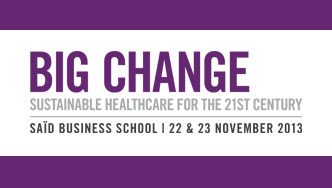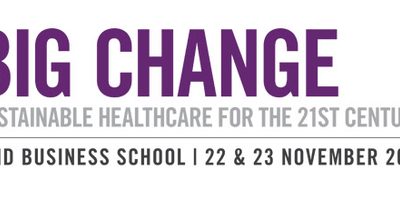
Indian representatives to influence future of global healthcare at Big Change 2013 in Oxford
At a time when billions of people have no access to even basic treatments for conditions most likely to kill or disable them, The George Institute for Global Health, an international health policy and research organisation, has made a call for a fundamentally different way to deliver health care to all who need it.
At the heart of this "Big Change" is the understanding that incremental changes to healthcare systems and practices will not suffice in tackling the major health challenges around the globe. The world needs a radically different approach to address these issues, and it needs it now. Big Change: sustainable healthcare for the 21st century, will focus on the need for affordable innovation that is both sustainable and can deliver healthcare to those who need it most.
India is a key proponent of such innovation, and as such will be represented by high profile healthcare researchers, policy makers, entrepreneurs and government officials. This major international event will take place at the University of Oxford on 22 – 23 November 2013.
"Innovation has an essential role to play, not only in improving healthcare standards around the world, but even in maintaining existing standards, given constrained funding," says Professor Stephen MacMahon, Principal Director of The George Institute.
The need for innovation is greatest of all in low-income countries, he argues. "In resource-poor parts of Asia, the models of healthcare that have developed in the west are inappropriate and impossible to apply. Instead, we need new tools, new delivery systems, and new financial models that will work in poor communities."
Big Change, Sustainable Healthcare for the 21st Century is a joint effort between The George Institute for Global Health and the Entrepreneurship Centre at Oxford University’s Saïd Business School, and is organised in partnership with "Silicon Valley comes to Oxford", which this year will focus on health care.
There will be four complementary streams each involving both plenary sessions and workshops: Innovation in Health Services Delivery; Innovation in Healthcare Technologies; Financing Healthcare Innovations; and Innovations in Pharmaceuticals and Biologics.
Leading experts and health care delivery innovators from India will be participating in this conference including:
- Dr Devi Shetty of Narayana Health
- Keshav Desiraju, Secretary to the Government of India, Health and Family Welfare
- Professor Balram Bhargava, Professor of Cardiology at the All-India Institute of Medical Sciences and Executive Director, Stanford-India Biodesign Centre
- Dr Ruchi Dass, Founder and CEO, HealthCursor
- Dr Vivekanand Jha, Executive Director, The George Institute for Global Health, India
Dr Shetty, whose Narayana Health has been able to reach lakhs of people in rural areas with affordable heart care surgery, says: "We believe India will become the first country in the world to dissociate healthcare from affluence. India will prove to the world that the wealth of the nation has little to do with the quality of healthcare its citizens can enjoy. Because we believe that quality of healthcare is only dependent on passion, dedication and skill of the people and everything else is a minor detail.
Dr Ruchi Dass Founder and CEO, HealthCursor, also believes in innovation. “Big Change is all about sustainable healthcare innovations, development and delivery. Innovation that reduces spiralling health-care costs, raises productivity and improves health outcomes is the best option for delivering a sustainable and scalable healthcare system. But, innovations always sound good in retrospect, after they've worked, and in isolation, when all the surrounding barriers to change don't have to be taken into account."
According to Dr Dass, the main roadblock to innovation in health care is not the limits of human imagination and creativity; it is how a complex system has grown up in which most players are busy dealing with economic, socio-political and environmental sustainability. I look forward to some interesting discussions at the Big Change conference."
Professor Balram Bhargava, Executive Director, of Stanford India Biodesign Center, who is credited with developing low cost indigenous stents that have benefitted several thousand patients, will also be participating in the conference. Professor of Cardiology at the All India Institute of Medical Sciences (AIIMS), he has promoted the Stanford-India Biodesign programme, a unique interdisciplinary programme to foster innovation and design in low cost implants/devices.
Another unique Indian approach that would be in focus at the conference is that of jugaad innovation. Professor Jaideep Prabhu, Director of the Centre for India and Global Business at Judge Business School, University of Cambridge and co-author of Jugaad Innovation, will speak about the "frugal and flexible approach" to innovation for the 21st century.
Jugaad has struck a chord all over a world still struggling with the consequences of major economic turmoil and seeking radical new models for business success. Professor Prabhu argues that the West must look to places like India, Brazil, and China for a new approach to innovation.
His book, which has already become a best-seller and has editions in French Japanese, Portugese, Dutch and Italian shows how jugaad is leading to dramatic growth in emerging markets and how Western companies can adopt jugaad innovation to succeed in a hypercompetitive world.
- Click here for more information on Big Change 2013
- Click here to view the full list of speakers at the conference




